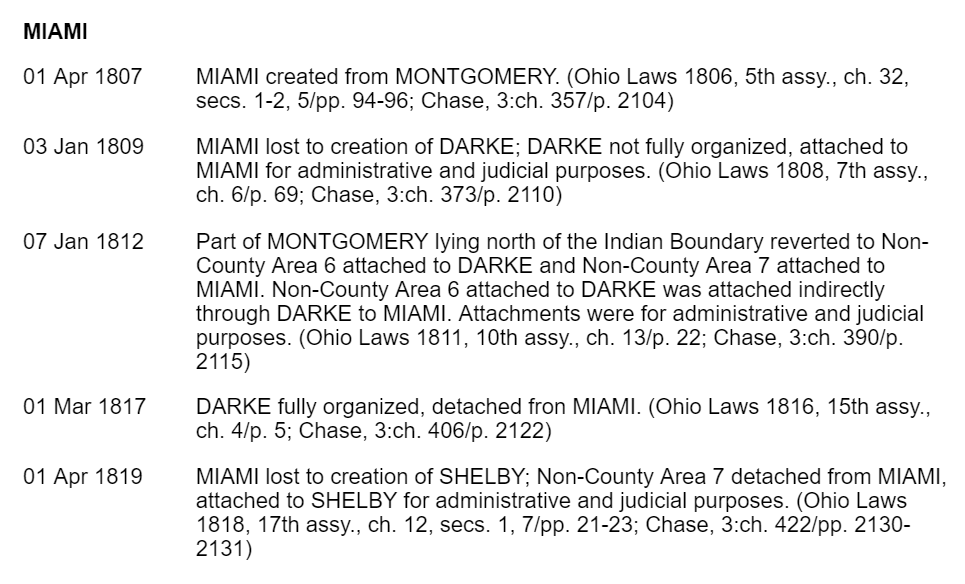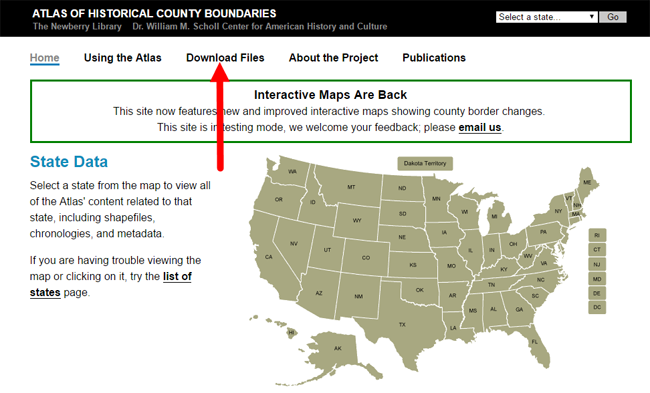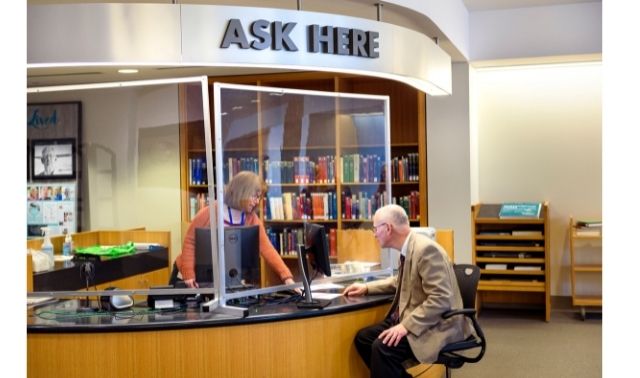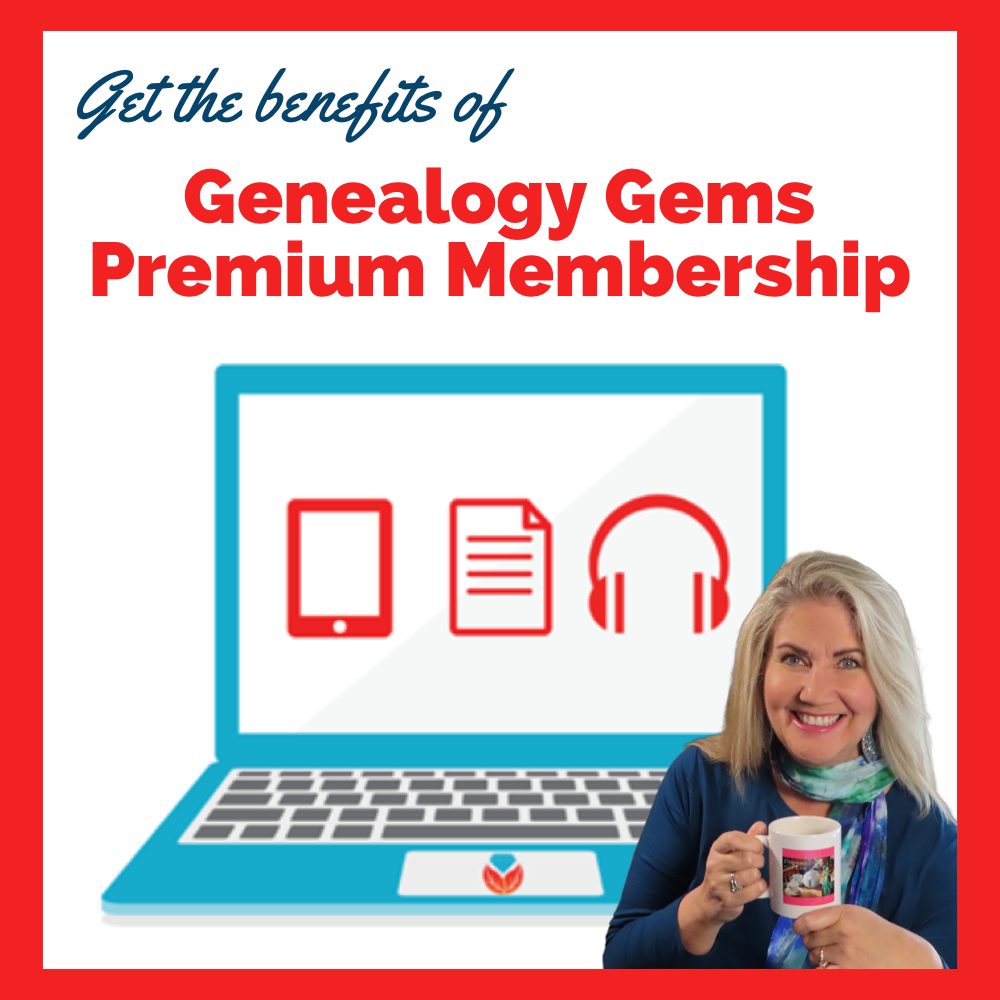Atlas of Historical County Boundaries
The online Atlas of Historical County Boundaries is a go-to resource for determining old U.S. county boundaries.

The atlas of historical county boundaries
How to find county boundaries with the Atlas of Historical County Boundaries in three steps
1. From the Atlas home page, click on the state of interest from the national interactive map.
2. From the state page, click on View Index of Counties and Equivalents. This will show you all current and past county names.
3. From this page, click on your targeted county. You’ll find a timeline of that county’s boundary changes.

Use the timeline to discover what county your ancestors belonged to at any given time. Perhaps you’ll discover you should actually be looking for an ancestor’s marriage record or probate in a parent county, one that existed there before the current county, or in a successor county later carved out of this one.
Google Earth Bonus: The Atlas of Historical Boundary Changes state pages include downloadable maps compatible with Google Earth and Google Maps. If you are not using Google Earth for genealogy yet, watch Lisa Louise Cooke’s free video to see how and why you want to use this amazing 3D map of the world for your family history! You can learn more about downloading the Atlas of Historical County Boundaries files to Google Earth in Lisa’s book The Genealogist’s Google Toolbox.

Learn More about Using Interactive Maps for Genealogy
- Illuminating Time-Lapse Videos Show Our Changing World
- Historical Maps of New York City and More Now Free Online
- Family Maps and Migration Routes Traced with New Tech Tools
Using Old Newspapers to Reconstruct an Ancestor’s Story – Podcast Episode 268
Listen to Genealogy Gems Podcast Episode 268
Episode Show Notes
Get 20% off Newspapers.com. Click here and use coupon code genealogygems
Visit Fort Wayne
Fort Wayne, Indiana is the home of the second largest free genealogy library in the country. Make your plans to visit today. Learn more at https://www.visitfortwayne.com

Learn more about the free genealogy resources at VisitFortWayne.com
Become a Genealogy Gems Premium Member
Premium Members have exclusive access to:
- Video classes and downloadable handouts
- The Genealogy Gems Premium Podcast
- Downloadable ad-free show notes PDF handouts
Become a member here.
Genealogy Gems Podcast App
Don’t miss the Bonus audio for this episode. In the app, tap the gift box icon just under the media player. Get the app.
Get the Free Genealogy Gems Newsletter
The Genealogy Gems email newsletter is the best way to stay informed about what’s available with your Premium eLearning Membership. Sign up today.
Follow Lisa and Genealogy Gems on Social Media:
Genealogy Gems Podcast Episode 259 Special Christmas Episode
A Cup of Christmas Tea with Best-Selling Author Tom Hegg

Get your copy of A Cup of Christmas Tea here.
Listen to Genealogy Gems Podcast Episode 259
In this special audio version of the interview, listen to Tom recite this wonderful story A Cup of Christmas Tea set to beautiful music. You’ll also hear him recite the children’s classic Peef the Christmas Bear. To Listen click the media player below (AUDIO ONLY):
Watch the Original Video
This audio comes from my YouTube video series Elevenses with Lisa. You can watch the video interview at the Elevenses with Lisa episode 38 show notes page.
Get $10 off StoryWorth
Become a Genealogy Gems Premium Member
Premium Members have exclusive access to:
- Video classes and downloadable handouts
- The Genealogy Gems Premium Podcast
- Elevenses with Lisa downloadable ad-free show notes PDF cheat sheets
Become a member here.
Genealogy Gems Podcast App
Don’t miss the Bonus audio for this episode. In the app, tap the gift box icon just under the media player. Get the app here.
Get the Free Genealogy Gems Newsletter
The Genealogy Gems email newsletter is the best way to stay informed about what’s available with your Premium eLearning Membership. Sign up today here.
Our Sponsor:
MyHeritage: Click here to start finding your family history at MyHeritage

MyHeritage.com is the place to make connections with relatives overseas, particularly with those who may still live in your ancestral homeland.
Follow Lisa and Genealogy Gems on Social Media:
- Instagram.com/genealogygemspodcast
- Facebook.com/genealogygems
- Pinterest.com/lisalouisecooke
- YouTube.com/GenealogyGems
Music: FairyTale Waltz by Kevin MacLeod is licensed under a Creative Commons Attribution 4.0 license. https://creativecommons.org/licenses/by/4.0/ Source: http://incompetech.com/music/royalty-free/index.html?isrc=USUAN1100232 Artist: http://incompetech.com/
We Wish You a Merry Christmas by Twin Musicom is licensed under a Creative Commons Attribution 4.0 license. https://creativecommons.org/licenses/by/4.0/ Artist: http://www.twinmusicom.org/



